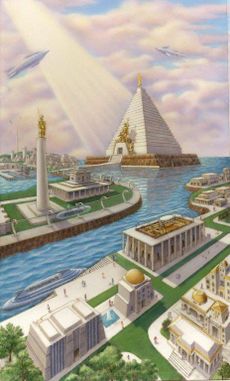Atlantyda
Kontynent wyspiarski, który istniał tam, gdzie obecnie znajduje się Ocean Atlantycki i który zatonął podczas kataklizmu (Potop Noego) około 11 600 lat temu, według obliczeń Jamesa Churchwarda. Żywo przedstawiony przez Platona; „widział” i opisał Edgara Cayce'a w swoich czytaniach; przywołany w scenach z „Romansu Atlantydy” Taylora Caldwella; naukowo zbadany i potwierdzony przez nieżyjącego już niemieckiego naukowca Otto Mucka, który ustalił czas i datę jej zniszczenia (przez asteroidę, która z siłą 30 000 bomb wodorowych spadła do Trójkąta Bermudzkiego) o godzinie 20:00, 5 czerwca 8498.!

Relacje z Atlantydy
W dialogach Timajos i Kritias Platon opowiada, że na „wyspie Atlantydy istniało wielkie i wspaniałe imperium”, które rządziło Afryką aż po Egipt, Europą aż po Włochy i „częściami kontynentu” (uważane za odniesienie do Ameryki, w szczególności Ameryki Środkowej, Peru i Doliny Mississippi). Postulowano, że Atlantyda i małe wyspy na wschód i zachód od niej utworzyły ciągły pomost lądowy z Ameryki do Europy i Afryki.
„Historia Atlantydy” W. Scotta-Elliota przedstawia zapisy cywilizacji Atlantydy ujawnione przez jasnowidzenie. Książka Scotta-Elliota jest kompilacją odkryć wielu studentów, którym według teozofa A. P. Sinnetta „pozwolono na dostęp do niektórych map i innych zapisów… Mówi, że te mapy zostały fizycznie zachowane przez inne rasy niż rasy obecnie okupujące Europę - przypuszczalnie przez Adeptów, którzy uczyli studentów teozofii, chociaż Sinnett tego nie precyzuje.
Scott-Elliot pisze, że kontynent był niszczony etapami, a kataklizm miał miejsce 800 000, 200 000 i 80 000 lat temu, a ostatnią pozostałością po Atlantydzie była wyspa-kontynent Posejdonis, położona w pobliżu Azorów, która w 9564 została zatopiona w katastrofie, o której mowa w wielu starożytnych pismach, w tym Platona.
Złoty wiek Jezusa na Atlantydzie
The ascended masters have revealed that Jesus reigned as emperor and high priest over a golden-age civilization on Atlantis that lasted two thousand years, from 34,550 B.C. until 32,550 B.C. This age was seventeen ages previous to our own, and it was under the sign of Cancer. Jesus was born in 33,050 B.C. and began his reign in 33,000 B.C. after the golden age had been in progress for over 1,500 years. His consort was his twin flame, whom we know as the ascended lady master Magda. They ruled because they were the highest representatives of God in embodiment in that civilization. All the people of this civilization knew and accepted God’s will. Jesus and Magda did not have to impose any rules on the people because they were all in attunement with their Divine Source.
However, after Jesus had reigned for 450 years, the seeds of corruption were sown by one called Xenos, who was chief counsellor to the emperor. Finally Xenos convinced the people to revolt against the government (personified in Jesus) because the government was supposedly not supporting them. Xenos took over as leader of the government. Jesus Christ, Magda and two million loyal subjects (20 percent of the people) went to the land that later was to become Suern—India including Arabia. Half of them made their ascension at that time; the other half have continued to evolve on earth until today.
On Atlantis, the once golden-age civilization gradually descended into barbarism as the people, imperceptibly to themselves, grew dense and insensitive to life. Looting and anarchy prevailed to the point where even Xenos lost control. Over time the cities disappeared and crumbled. Barbarism reigned on Atlantis from 30,000 B.C. to 16,000 B.C., when the great civilization of Poseid arose.
Later years of Atlantis
About 15,000 B.C., Jesus returned as the ruler, the Rai, of Atlantis. As described by Phylos the Tibetan in his book A Dweller on Two Planets, this great Rai appeared in the Temple of the capital, Caiphul, and caused to spring up there the Maxin, the Fire of Incal. This unfed flame burned on the altar of the temple for five thousand years. The Rai of the Maxin Light ruled for 434 days. He revised the laws and provided a legal code that governed Atlantis for thousands of years to come.
After a long golden age, the civilization of Atlantis was corrupted by false priests, until “God saw that the wickedness of man was great in the earth, and that every imagination of the thoughts of his heart was only evil continually.”[1] The last remnant of Atlantis went down in the great cataclysm that is recorded in the Bible as the Flood of Noah.
For more information
H. P. Blavatsky, The Secret Doctrine (London: Theosophical Publishing Co., 1888), Vol. II, see index for the many references to and descriptions of Atlantis.
Edgar Cayce, Atlantis (Virginia Beach: A.R.E. Press, 2014).
W. Scott-Elliot, Legends of Atlantis and Lost Lemuria (Wheaton: Theosophical Publishing House [Quest Books], 1925, 1990), pp. 3–89.
Phylos the Tibetan, A Dweller on Two Planets (Borden, 1952).
James Churchward, The Lost Continent of Mu (1931; reprint, New York: Paperback Library Edition, 1968), p. 226.
Otto Muck, The Secret of Atlantis (New York: Pocket Books, 1979).
Ignatius Donnelly, Atlantis: The Antediluvian World (New York: Dover Publications, 1976), pp. 11, 23, 173, 473.
Lectures on Atlantis delivered by Elizabeth Clare Prophet, based on the teachings of the ascended masters and A Dweller on Two Planets, by Phylos the Tibetan, are available from www.AscendedMasterLibrary.org.
Sources
Mark L. Prophet and Elizabeth Clare Prophet, Saint Germain On Alchemy: Formulas for Self-Transformation.
Mark L. Prophet and Elizabeth Clare Prophet, Lords of the Seven Rays.
Mark L. Prophet and Elizabeth Clare Prophet, The Masters and Their Retreats.
- ↑ Gen. 6:5.
